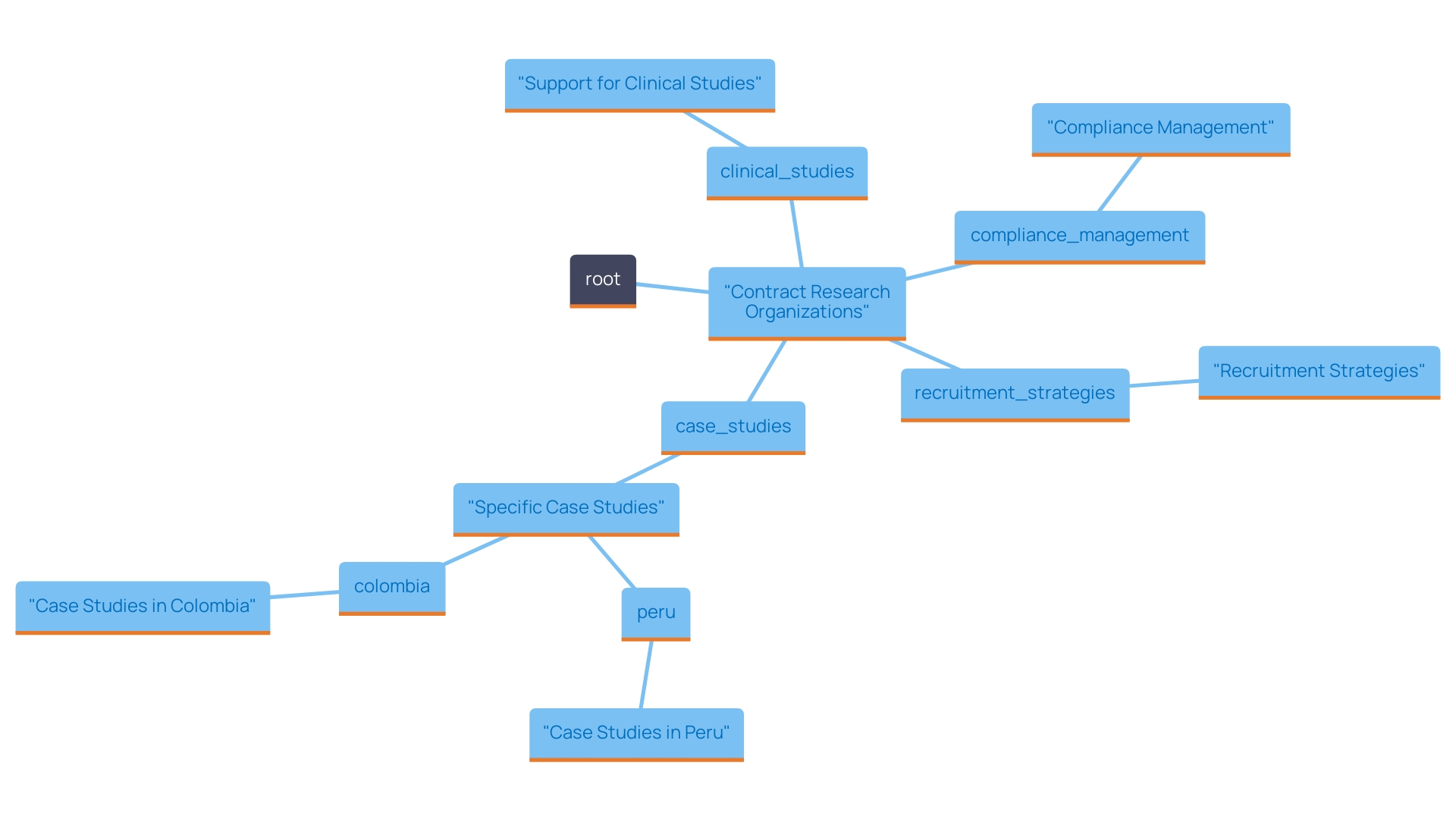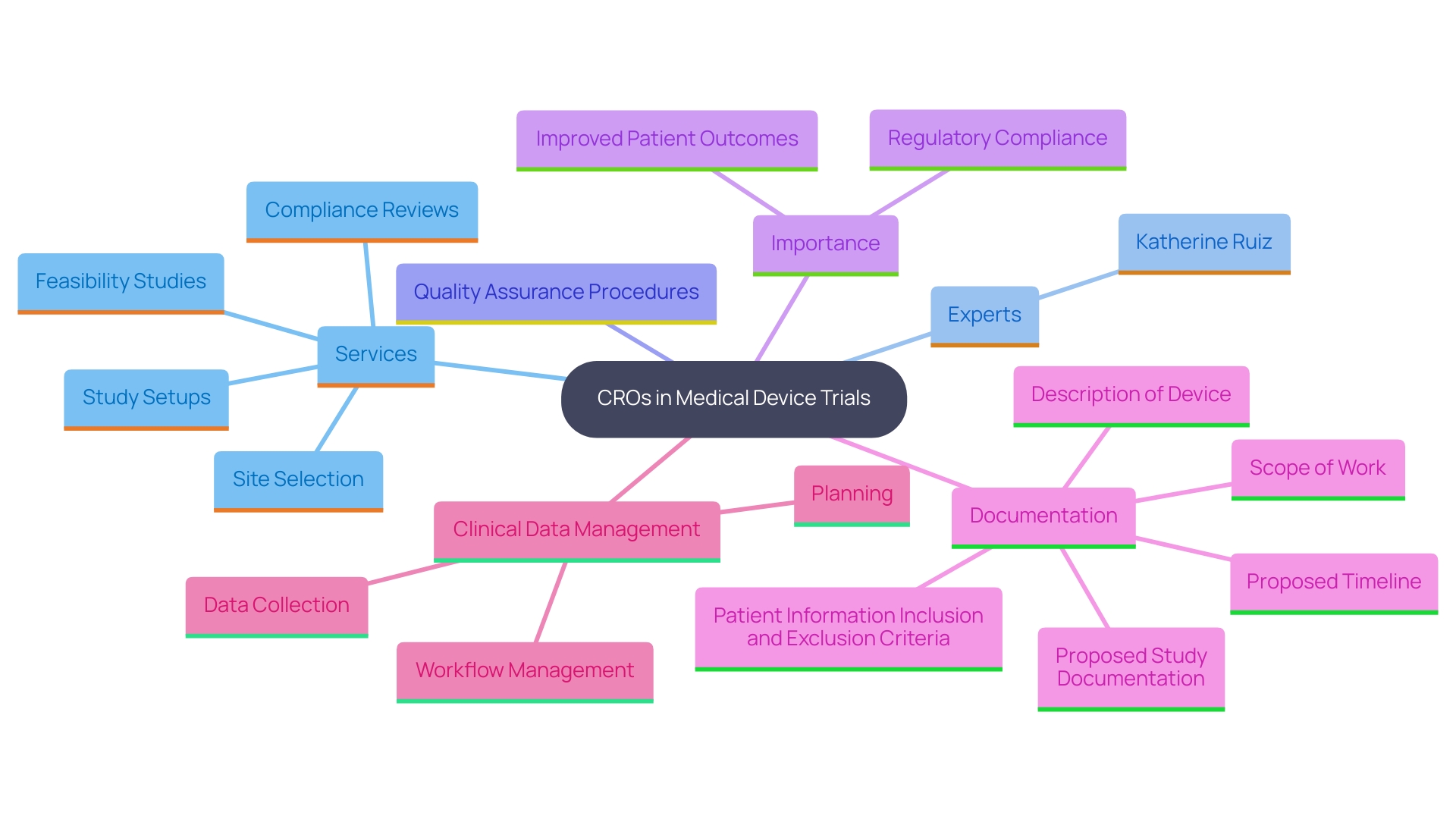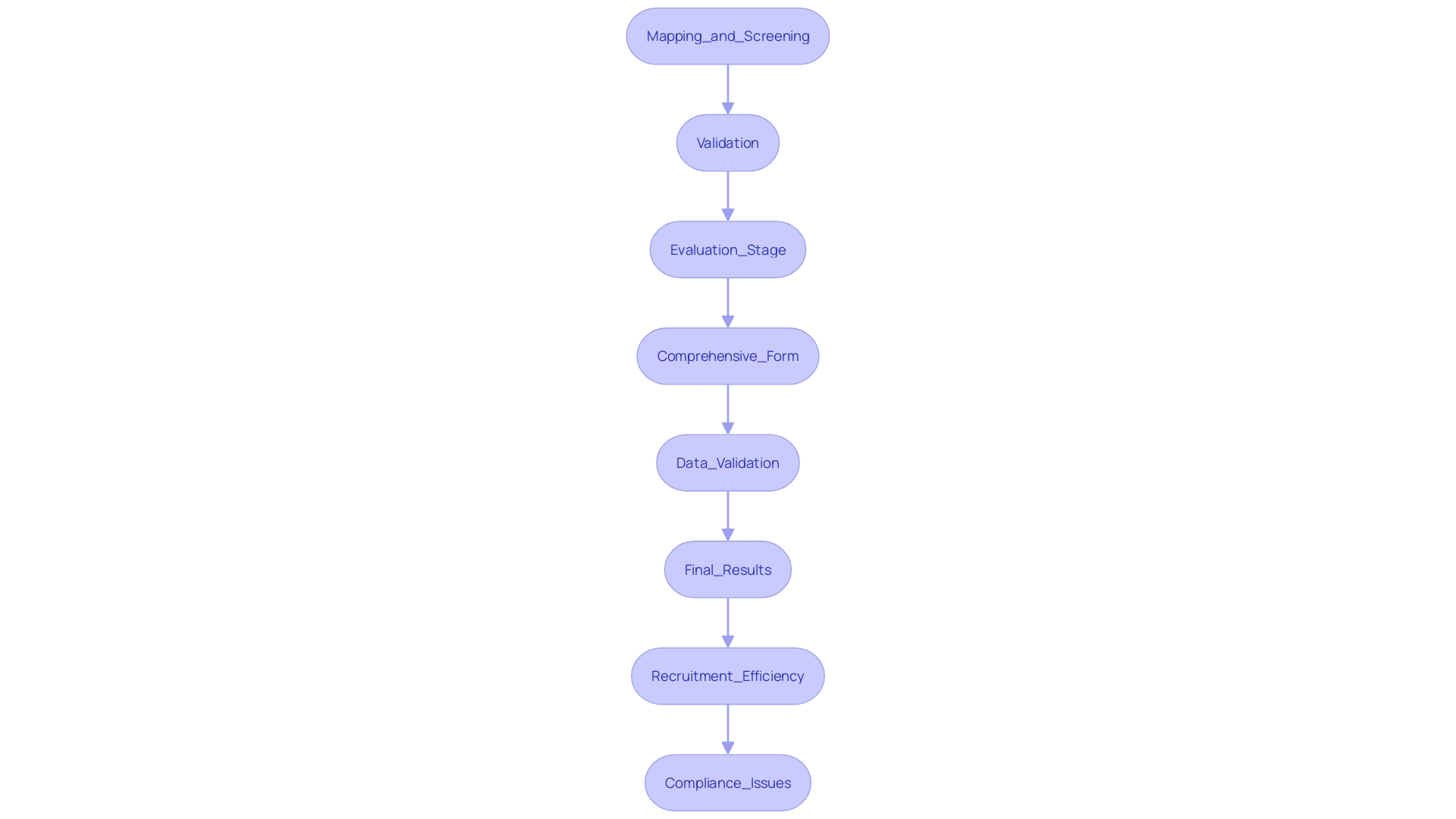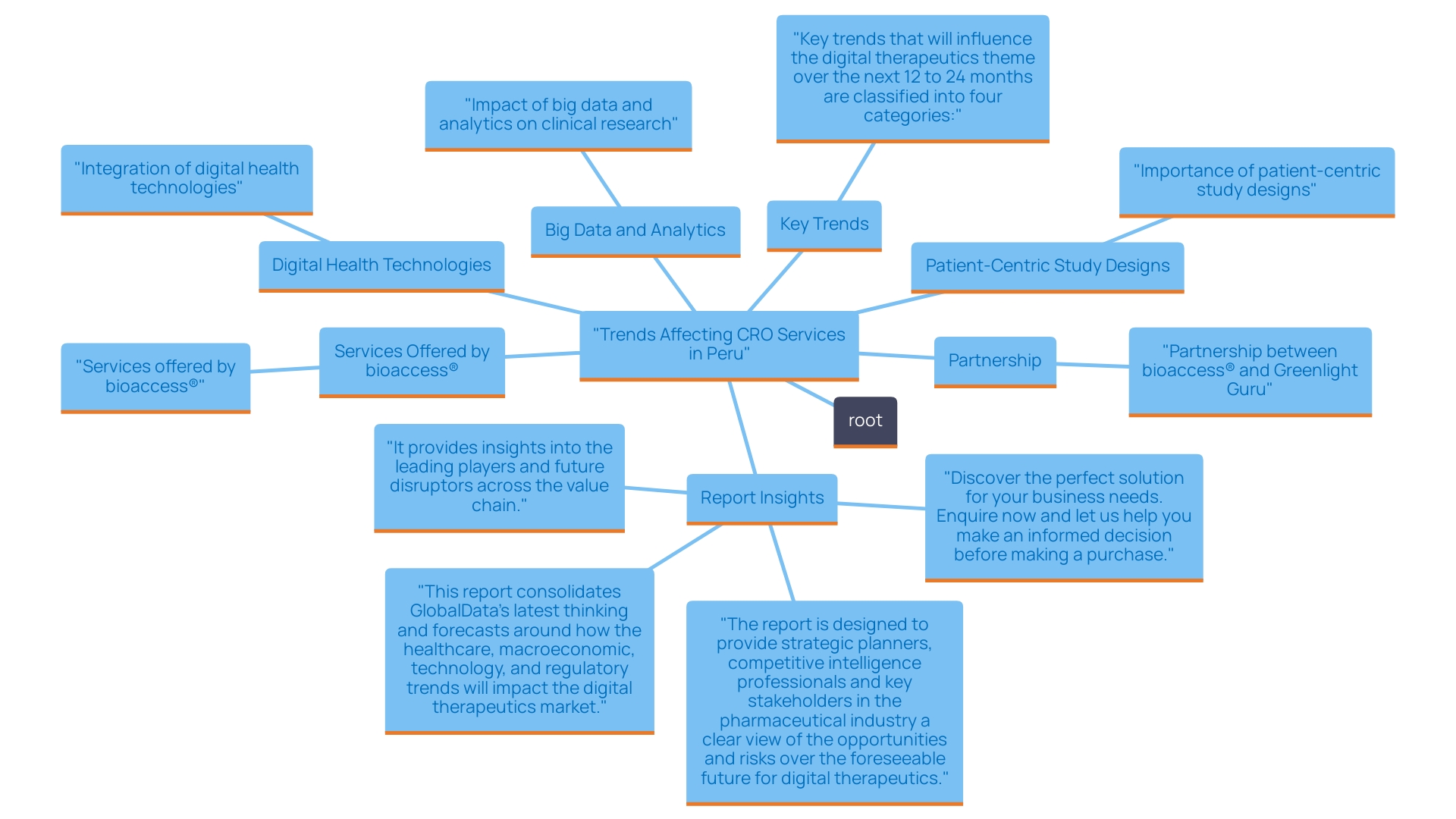


In the realm of medical device trials, Contract Research Organizations (CROs) emerge as crucial players, particularly in the context of Peru's intricate regulatory landscape. These specialized entities not only facilitate the development and management of clinical trials but also bridge the gap between device manufacturers and regulatory authorities, ensuring compliance with both local and international standards. As the demand for innovative medical technologies grows, understanding the multifaceted role of CROs becomes essential for stakeholders aiming to navigate challenges such as regulatory hurdles, patient recruitment, and trial execution.
This article delves into the significance of CROs in Peru, exploring their impact on trial success, the challenges they face, and the future trends shaping their services in the evolving landscape of medical research.
Contract Research Organizations are specialized entities that offer extensive services to assist in the development and management of clinical studies for medical devices. They play an essential role in supporting the research process by providing knowledge in compliance, study design, recruitment strategies, and data management.
Specifically, in Peru, contract research organizations are essential for navigating the complex and evolving compliance landscape, which includes challenges such as varying approval timelines and the need for local ethical committee reviews. By acting as intermediaries between device manufacturers and regulatory authorities, CROs ensure that all activities comply with national and international standards. Their management of various logistical aspects, including site selection and monitoring, allows sponsors to focus on their core competencies, ultimately accelerating the development of innovative medical technologies.
For instance, ReGelTec has successfully conducted an Early Feasibility Study on HYDRAFIL™ for treating chronic low back pain in Colombia, demonstrating the effectiveness of CRO support in patient recruitment and study management. Additionally, GlobalCare Clinical Studies' partnership with bioaccess™ has improved their clinical ambulatory services in Colombia, achieving over a 50% reduction in recruitment time and a remarkable 95% retention rate.
These examples demonstrate how contract research organizations can effectively tackle common challenges encountered by medical device startups, including compliance obstacles and recruitment issues.

CROs play a vital role in ensuring that medical device trials in Peru adhere to the requirements set by organizations like the Peruvian Agency for Medicines and Health Products (DIGEMID). With their deep understanding of the local compliance framework, they provide invaluable guidance on the submission of compliance documents, ethical considerations, and adherence to Good Clinical Practice (GCP) standards.
For instance, a CRO successfully aided a medical device sponsor in navigating complex compliance hurdles, resulting in timely approval for a groundbreaking device that ultimately improved patient outcomes. By utilizing their knowledge in comprehensive services such as:
contract research organizations assist sponsors in avoiding typical pitfalls that can result in regulatory breaches. Experts such as Katherine Ruiz, a distinguished authority in medical device and in vitro diagnostic regulation, ensure that studies comply with local regulations, leveraging her extensive experience in obtaining market clearance for innovations in Colombia.
Moreover, contract research organizations establish strong quality assurance procedures and oversight systems to ensure that studies are carried out ethically and safely, which is essential for preserving the confidence of participants and stakeholders alike. The success of clinical studies significantly depends on the capacity to maneuver through these compliance environments, and contract research organizations are vital allies in attaining this objective, ultimately promoting global health enhancement through international cooperation and innovation in Medtech.

Organizations conducting research in Peru face numerous obstacles that can significantly hinder the progress of medical device trials. A primary challenge is the frequent changes in compliance requirements, which necessitate constant vigilance and adaptability from clinical research organizations to ensure adherence. Julio G. Martinez-Clark, CEO of bioaccess®, emphasizes the critical nature of this issue, mentioning that careful navigation of the compliance landscape is essential to avoid delays and setbacks. Recent reports indicate that 45% of clinical research organizations have encountered significant delays directly linked to regulatory changes, highlighting the urgency of this challenge.
Furthermore, the difficulty in accessing qualified research sites and patient populations complicates recruitment efforts, often preventing CROss from meeting enrollment targets within desired timelines. Statistics indicate that recruitment rates in Peru are approximately 30% lower than in neighboring countries, emphasizing the need for innovative strategies. This challenge is compounded by resource constraints—both financial and human—that limit the efficiency and effectiveness of execution. Collectively, these factors present significant hurdles that require innovative approaches to overcome.
The Covid-19 pandemic has further emphasized the significance of adaptability in clinical studies. During this period, numerous pharmaceutical firms encountered heightened patient recruitment delays and drug supply shortages, prompting a shift towards more agile study designs. This adaptability is crucial for clinical research organizations in Peru, where building strong relationships with local healthcare providers and leveraging technology can enhance recruitment and streamline data management processes.
To address these challenges, a multifaceted strategy is essential. bioaccess® emphasizes thorough research study management services, including:
By nurturing strong collaborations with local healthcare organizations and employing cutting-edge technological solutions, contract research organizations can enhance recruitment efficiency and guarantee the seamless implementation of studies despite compliance and logistical challenges. Furthermore, aligning strategies with the Colombian government's initiative to boost research participation can assist CROss in accessing a wider patient base and enhancing overall study results. With experts like Katherine Ruiz, a Regulatory Affairs authority in Colombia, bioaccess® is well-positioned to navigate these complexities and drive global health improvement through international collaboration and innovation in Medtech.

As the clinical research landscape continues to evolve, several trends are likely to influence the future of CRO services for medical device studies in Peru. The integration of digital health technologies, such as telemedicine and remote monitoring, is expected to significantly enhance study efficiency and participant engagement.
In addition, there is a growing emphasis on patient-centric study designs that prioritize participant needs and experiences, which CROss must incorporate into their operational models. The partnership between bioaccess® and Greenlight Guru illustrates this trend, aiming to expedite Medtech advancements and research in Latin America, as demonstrated by successful initiatives such as PAVmed's first-in-human study in Colombia.
To guide Medtech research in the region, bioaccess® offers extensive management services for studies, including:
Furthermore, leveraging big data and advanced analytics will enable clinical research organizations to optimize trial designs and improve decision-making processes. As regulatory bodies evolve to embrace innovative methodologies, CROss will need to stay ahead of these trends to maintain their relevance and effectiveness in the clinical research ecosystem.

The role of Contract Research Organizations (CROs) in medical device trials in Peru is increasingly significant, particularly as the regulatory landscape becomes more complex. By providing expertise in regulatory compliance, trial design, and patient recruitment, CROs serve as essential partners for device manufacturers navigating the intricacies of clinical trials. Their ability to effectively manage logistical challenges and ensure adherence to both local and international standards is critical for the success of these trials.
Despite the many advantages they offer, CROs face substantial challenges, including frequent regulatory changes and difficulties in accessing qualified patient populations. These obstacles can hinder recruitment efforts and delay trial progress, underscoring the need for innovative strategies and flexible trial designs. The ongoing evolution of the clinical research landscape, particularly in light of the Covid-19 pandemic, has made adaptability a key component of CRO operations.
Looking ahead, the integration of digital health technologies and a focus on patient-centric trial designs are set to transform CRO services in Peru. As these organizations embrace new methodologies and leverage data analytics, they will be better equipped to enhance trial efficiency and participant engagement. By remaining responsive to emerging trends and regulatory developments, CROs can continue to play a pivotal role in advancing medical device research, ultimately contributing to improved healthcare outcomes in the region.
What are Contract Research Organizations (CROs)?
Contract Research Organizations (CROs) are specialized entities that provide extensive services to assist in the development and management of clinical studies for medical devices, offering expertise in compliance, study design, recruitment strategies, and data management.
How do CROs support clinical studies in Peru?
In Peru, CROs help navigate the complex compliance landscape, which includes varying approval timelines and local ethical committee reviews. They act as intermediaries between device manufacturers and regulatory authorities, ensuring compliance with national and international standards.
What logistical aspects do CROs manage for clinical studies?
CROs manage various logistical aspects such as site selection, monitoring, and recruitment, allowing sponsors to focus on their core competencies and accelerating the development of innovative medical technologies.
Can you provide examples of successful CRO support in clinical studies?
Yes, ReGelTec conducted an Early Feasibility Study on HYDRAFIL™ in Colombia, showcasing effective patient recruitment and study management. Additionally, GlobalCare Clinical Studies partnered with bioaccess™, achieving over a 50% reduction in recruitment time and a 95% retention rate.
What challenges do organizations face when conducting research in Peru?
Organizations face challenges such as frequent changes in compliance requirements, difficulties in accessing qualified research sites and patient populations, and resource constraints that hinder recruitment efforts.
How do CROs help overcome compliance challenges in clinical studies?
CROs provide guidance on compliance documents, ethical considerations, and adherence to Good Clinical Practice (GCP) standards, helping sponsors navigate complex compliance hurdles and avoid regulatory breaches.
What strategies do CROs implement to enhance recruitment and study management?
CROs employ strategies such as feasibility assessments, site selection, compliance evaluations, and project oversight while building strong relationships with local healthcare providers and leveraging technology to improve recruitment efficiency.
What trends are influencing the future of CRO services in Peru?
Trends include the integration of digital health technologies, a focus on patient-centric study designs, and the use of big data and advanced analytics to optimize trial designs and decision-making processes.
What services do bioaccess® offer for Medtech research in Peru?
Bioaccess® offers extensive management services, including feasibility assessments, site selection, compliance evaluations, study setup, import permits, project oversight, and reporting.